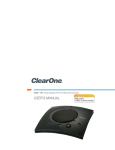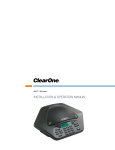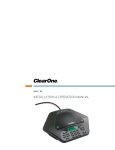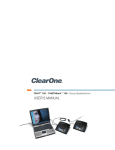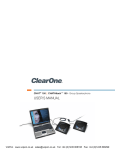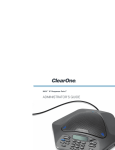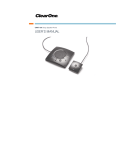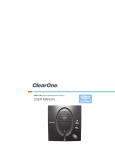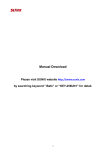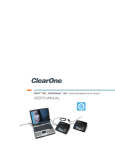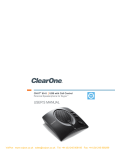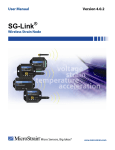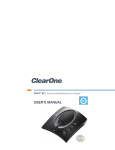Download USER'S MANUAL - Headset Konferenstelefoner Avicom
Transcript
CHAT 150 Group Speaker Phone USER’S MANUAL TABLE OF CONTENTS TELEPHONE FAX EMAIL ON THE WEB 1.800.283.5936 1.801.974.3760 1.801.974.3669 [email protected] www.clearone.com CHAT 150 USER’S MANUAL CLEARONE PART NO. 800-156-201. MARCH 2008 (REV. 2.1) © 2008 ClearOne Communications, Inc. All rights reserved. No part of this document may be reproduced in any form or by any means without written permission from ClearOne Communications. ClearOne reserves specific privileges. Information in this document is subject to change without notice. U.S. PATENTS: D539,274; D556,189; D531,999. OTHER PATENTS PENDING. TABLE OF CONTENTS CONTINUED CHAPTER 1: INTRODUCTION Product Overview . . . . . . . . . . . . . . . . . . . . . . . . . . . . . . . 1 Service and Support . . . . . . . . . . . . . . . . . . . . . . . . . . . . 1 Important Safety Information . . . . . . . . . . . . . . . . . . . . . . 2 Unpacking . . . . . . . . . . . . . . . . . . . . . . . . . . . . . . . . . . . . 3 Replacement Parts & Accessories . . . . . . . . . . . . . . . . . 3 Chat 150 Configurations . . . . . . . . . . . . . . . . . . . . . . . . . 4 CHAPTER 2: GETTING STARTED Installing the Chat 150 Software-Windows . . . . . . . . . . . 5 Configuring your Chat 150. . . . . . . . . . . . . . . . . . . . . . . 10 My Devices. . . . . . . . . . . . . . . . . . . . . . . . . . . . . . . . . . . 12 Optimizing Sound Quality . . . . . . . . . . . . . . . . . . . . . . . 12 Connecting the Chat 150 to a Telephone . . . . . . . . . . . 14 Connecting the Chat 150 to a Video Conferencing Device . . 17 Connecting the Chat 150 to a PC . . . . . . . . . . . . . . . . . 20 CHAPTER 3: USING THE CHAT APPLICATION Device Setup . . . . . . . . . . . . . . . . . . . . . . . . . . . . . . . . . 21 My Devices. . . . . . . . . . . . . . . . . . . . . . . . . . . . . . . . . . . 22 Update Firmware & Database . . . . . . . . . . . . . . . . . . . . 23 Help . . . . . . . . . . . . . . . . . . . . . . . . . . . . . . . . . . . . . . . . 27 Advanced . . . . . . . . . . . . . . . . . . . . . . . . . . . . . . . . . . . . 27 Advanced Settings: Audio Settings . . . . . . . . . . . . 28 Advanced Settings: Database . . . . . . . . . . . . . . . . 29 Advanced Settings: Log . . . . . . . . . . . . . . . . . . . . . 32 CHAPTER 4: USING THE CHAT 150 LED Indicators . . . . . . . . . . . . . . . . . . . . . . . . . . . . . . . . 33 Volume Up/Down and Mute Buttons . . . . . . . . . . . . . . . 33 Phone Breakout Box . . . . . . . . . . . . . . . . . . . . . . . . . . . 33 VC Breakout Box . . . . . . . . . . . . . . . . . . . . . . . . . . . . . . 33 CHAPTER 5: MAINTENANCE Caring for Your Chat 150 . . . . . . . . . . . . . . . . . . . . . . . . 34 Troubleshooting . . . . . . . . . . . . . . . . . . . . . . . . . . . . . . . 34 Recovering from an Interrupted Firmware Update . . . . . . . . . . . . . . . . . . . . . . . . . . . . . . 35 CHAPTER 6: APPENDIX Specifications. . . . . . . . . . . . . . . . . . . . . . . . . . . . . . . . . 36 Compliance . . . . . . . . . . . . . . . . . . . . . . . . . . . . . . . . . . 37 Warranty . . . . . . . . . . . . . . . . . . . . . . . . . . . . . . . . . . . . . 39 CHAPTER 1: INTRODUCTION PRODUCT OVERVIEW Thank you for purchasing the ClearOne Chat 150 group speaker phone. The Chat 150 is a speaker phone for individual or small group use. The Chat 150 connects to telephones, PCs, and video conferencing systems for rich, full-duplex audio communications. You can use the Chat 150 with a variety of devices and applications, including: • Enterprise telephones, such as Avaya, Cisco, and others • Video conferencing systems, such as Tandberg, Sony, Polycom, and others • Internet telephony applications, such as Skype and Vonage • VoIP softphones, such as Avaya, Cisco, CounterPath, and others • Web conferencing, such as IBM/Lotus Workplace, Microsoft NetMeeting, and others • Instant messaging applications with voice, such as AIM, MSN, and others • Audio playback, such as iTunes, Quicktime, RealPlayer, and others SERVICE AND SUPPORT If you need additional information on how to set up or operate your Chat 150 group speaker phone, please contact us. We welcome and encourage your comments so we can continue to improve our products and better meet your needs. TECHNICAL SUPPORT Telephone: 1.800.283.5936 (USA) or 1.801.974.3760 Fax: 1.801.977.0087 E-mail: [email protected] Web site: www.clearone.com SALES AND CUSTOMER SERVICE Telephone: 1.800.945.7730 (USA) or 1.801.975.7200 Fax: 1.800.933.5107 (USA) or 1.801.977.0087 E-mail: [email protected] PRODUCT RETURNS All product returns require a return material authorization (RMA) number. Please contact ClearOne Technical Support before attempting to return your product. Make sure you return all the items that shipped with your product. Chapter 1: Introduction 1 IMPORTANT SAFETY INFORMATION Read the safety instructions before using this product. This personal speaker phone is not designed for making emergency telephone calls when the power fails. You must make alternative arrangements for telephone access to emergency services. • Read and understand all instructions. Follow all warnings marked on the product. • Unplug the product from the outlet before cleaning. Do not use liquid cleaners or aerosol cleaners. Use only a damp cloth for cleaning. • Do not use this product in or near water, for example, near a bathtub, kitchen sink, or swimming pool. • Place this product on a flat, level, dry surface for ongoing operation. • Never place product near heat radiators or registers. Allow adequate ventilation for heat dissipation. • This product should only be operated using a power source specified on the product label. If you are not sure about the power source at your location, consult your dealer or local power company. • Do not overload wall outlets and extension cords; this can cause fires or electric shock. • Never spill liquid on or into the product. • Do not disassemble this product. Opening or removing covers can expose you to dangerous voltages and other risks. Incorrect reassembly can cause electric shock during subsequent use. Disassembly voids the warranty. • Unplug the product from the outlet and contact a qualified service technician under the following conditions: a. When the power supply cord or plug is damaged or frayed. b. If liquid has been spilled into the product. c. If the product does not operate normally by following the operating instructions. d. If the product has been dropped or damaged. e. If the product exhibits a distinct change in performance. • Avoid telephones during an electrical storm. There is a risk of electric shock from lightning. • Do not use this product to report a gas leak in the vicinity of the leak. • Do not use this product near intensive care medical equipment or by persons with pacemakers. • This product can interfere with electrical equipment such as answering machines, TV sets, radios, computers and microwave ovens. Do not place the product in close proximity to any of these devices. Save these instructions 2 Technical Support:: 800.283.5936 UNPACKING The illustration below shows the parts that ship in the box with each model of the Chat 150. (Figure 1.1). Contact your dealer for replacement parts and accessories. Chat™ 150 USB 910-156-200 Chat™ 150 VC 910-156-230 + + ++ + + + Chat™ 150 AVAYA 910-156-222 + + + + + Chat™ 150 Cisco 310-156-220 + + + + + FIGURE 1.1 Chat 150 Package Contents > Note: ClearOne is not responsible for product damage incurred during shipment. You must make claims directly with the carrier. Inspect your shipment carefully for obvious signs of damage. If the shipment appears damaged, retain the original boxes and packing material for inspection by the carrier. Contact your carrier immediately. To ensure safety and regulatory compliance, use only the power supply provided with your Chat 150. Approved power supplies include: Glob Tek Model: GT- 41052-1509, and Phihong Model: PSA05R-090. If your power supply is lost or damaged, contact ClearOne Technical Support for an approved replacement. REPLACEMENT PARTS & ACCESSORIES The illustration below shows all parts and accessories available for the Chat 150 (Figure 1.2). Contact your dealer for replacement parts or accessories. Chat™ 150 Cisco Accessory Kit 860-156-220L Chat™ 150 AVAYA Accessory Kit 860-156-222L Chat™ 150 VC Accessory Kit 860-156-230 Chat 150 USB cable (10’) 830-156-200 Break out box for Cisco 2400, 4600 & 9600 telephone handsets Break out box for Cisco 24XX & 4600 telephone handsets Break out box for video conferencing system Chat 150 Link cable (12’) Chat 150 Link cable (12’) Chat 150 Link cable (25’) Chat 150 Link cable (RJ-9/RJ-9) Chat 150 Link cable (RJ-9/RJ-9) Chat 150 RCA audio cable Chat 150 universal power supply Chat 150 universal power supply Chat 150 universal power supply Chat 150 Link cable (25’) 830-158-011L FIGURE 1.2 Chat 150 Parts & Accessories Chapter 1: Introduction 3 CHAT 150 CONFIGURATIONS The Chat 150 comes in several configurations, as shown below. The Chat 150 group speaker phone itself is the same in all configurations; different accessories have been packaged with the unit to enable a variety of connections. All Chat 150 units have a mini-USB port, so every configuration can connect to a PC. Configuration Usage Profile Chat 150 for Avaya & Cisco Telephone Handsets) Connects to the headset jack of the Avaya or Cisco handset for full-duplex speaker phone capability. Chat 150 USB Connects to the USB port of a PC (or laptop) for use with softphones, internet telephony applications, web conferencing, instant messaging with audio, etc. Chat 150 VC Connects to any video conferencing system for full-duplex speaker phone capability. 4 Technical Support: 800-283-5936 CHAPTER 2: GETTING STARTED INSTALLING THE CHAT 150 SOFTWARE FOR WINDOWS > Note: The following instructions show Windows XP screenshots. However, the installation procedure is the same for Windows XP and all versions of Windows Vista. 1. Insert the Chat 150 CD into your computer’s CD/DVD drive. Your system should auto-run the installation software and display the initial menu screen (Figure 2.1). FIGURE 2.1 Chat 150 Installation Wizard Welcome Screen > Note: If you do not have the CD, you can download the latest version of the software at: http://www.clearone.com/support/downloads.php?content=main. Select your device from the “BY PRODUCT” window and click SEARCH and the screen will display only those downloads available for your specific device. Select the latest version of the Chat 50/150 Software and the system will display a confirmation window for the software to be downloaded to your computer. Unzip the folder and run Setup.exe to begin the installation process. Chapter 2: Getting Started 5 2. Select Software from the menu on the left of the screen and the Chat Setup Wizard will display the installation welcome screen (Figure 2.2 ). Click Next>. The License Agreement screen appears (Figure 2.2). FIGURE 2.1 Chat 150 Installation Wizard Welcome Screen 3. Read the license agreement and select the I Agree radio button, then click Next> to proceed with the installation. FIGURE 2.3 Chat 150 License Agreement screen 6 Technical Support: 800-283-5936 4. The Select Installation Folder screen appears (Figure 2.4). You can change the target installation folder, if you wish, or simply accept the default folder shown by clicking Next> to continue.. FIGURE 2.4 Chat 150 Select Installation Folder screen 5. The Confirm Installation screen appears (Figure 2.5). Click Next> to continue the installation. FIGURE 2.5 Chat 150 Confirm Installation screen Chapter 2: Getting Started 7 6. The Installing ClearOne Chat screen appears (Figure 2.6) showing the progress of the installation. FIGURE 2.6 Installing ClearOne Chat Software screen 7. When the software is installed, the Device Driver Installation Wizard screen appears (Figure 2.7). Click Next> to install the Chat software drivers for Windows. FIGURE 2.7 Chat 150 Device Driver Installation Welcome screen 8 Technical Support: 800-283-5936 8. Once the device drivers are successfully installed, the Driver Name and Status appear in the Device Driver Installation Wizard screen (Figure 2.8). Click Finish to complete the installation. FIGURE 2.8 Chat 150 Completing the Device Driver Installation Wizard screen 9. The Installation Complete screen appears (Figure 2.9). Click Close to exit the Chat installation program. FIGURE 2.9 Chat 150 Installation Complete screen The Chat software installation is complete. You can start the Chat software by double-clicking on the ClearOne Chat icon that is now on your Windows desktop, or through the Windows Start menu (Start > All Programs > ClearOne Communications > Chat > ClearOne Chat). Before using the Chat 150 for the first time, proceed with the audio settings configuration procedure that starts on page 10. This will ensure optimal sound quality for each device and application you plan to use with the Chat 150. Chapter 2: Getting Startede 9 CONFIGURING YOUR CHAT 150 This section describes how you configure your Chat 150 for the specific devices you are connecting to. The Chat software contains a database of pre-configured device settings that allows you to instantly select and apply optimal settings for supported devices. > Note: From time to time, ClearOne adds additional devices to the database. To update your Chat software to include all currently supported devices, see the Update Firmware & Database section later in this chapter.. If the specific device you are using with the Chat 150 is not listed in the database, you can create a custom device by following the instructions described later in this chapter. To configure the Chat 150 for your devices, perform the following steps: 1. Start the Chat software by double-clicking the ClearOne Chat icon on your desktop (Figure 2.10), or by launching the application from your PC’s Start menu. FIGURE 2.10 Chat 150 Desktop Icon The main screen of the Chat software will be displayed (Figure 2.11). FIGURE 2.11 Device Setup Screen 10 Technical Support: 800-283-5936 2. Click Device Setup from the buttons on the left. The Device Setup screen appears displaying the general types of devices you can configure for use with the Chat 150 (Figure 2.12). FIGURE 2.12 My Devices Screen 3. From the Select 1st column, select the type of device you are connecting to the Chat 150. 4. In the Select 2nd column, select the manufacturer of your device. If you are selecting PC and Laptop, select All. If you are connecting to a VC Breakout Box and your manufacturer is not listed, select Other. 5. Select the model of the device from the list in the Select 3rd column. If you selected PC and Laptop, select All. If you selected VC Breakout Box and the specific model number is not listed, select Other. 6. Once all three selections have been made, the Add to My Devices and Apply to Chat buttons at the bottom of the screen will become active. 7. When you are satisfied with your selections in all three columns, click the Apply to Chat button to apply these settings to the Chat 150. A message will appear indicating that the settings were successfully applied to your Chat 150. 8. Click the Add to My Devices button and an entry containing these settings will be created in the My Devices screen allowing you to instantly select and apply this configuration in the future. A message will appear indicating that the device was successfully added. 9. Repeat steps 1 through 8 for any additional devices you will be using with your Chat 150. To ensure optimal sound quality, you need to customize the Chat 150’s audio settings for every application and device you will use. Refer to the tuning procedures provided in the OPTIMIZING SOUND QUALITY section that follows. Chapter 2: Getting Startede 11 MY DEVICES My Devices displays all of the devices that you have configured for use with your Chat 150 (Figure 2.13). This screen allows you to easily switch between settings for your listed devices, including any saved custom configurations, if you have created custom audio settings for your device (see Advanced Settings: Database later in this chapter for more information on saving custom settings). FIGURE 2.13 My Devices Screen Select the device you wish to use with your Chat 150, and click the Apply to Chat button to apply the audio settings to your Chat 150. To remove a device from your list of My Devices, select the device from the list and click the Remove from My Devices button. Note that this only removes the device from the My Devices list. It does not remove it from the device database (see the Advanced: Database section later in this chapter for more information.) OPTIMIZING SOUND QUALITY For optimal sound quality, you must adjust the Chat 150’s audio settings for each device and application you will be using as described in the procedures below. > Note: The volume settings in the Chat software are synchronized with the Windows volume settings. Changing the volume using the Chat software or the buttons on the Chat 150 also changes the volume settings in Windows. Conversely, changing the volume settings in Windows will change the settings in the Chat software. Using The Chat Application With Pre-Defined Device Settings The pre-defined device settings available in the Chat application will provide good sound quality for many of the most popular devices used with the Chat 150. If you used the procedure in the previous section to configure the Chat 150’s settings for one of these devices, test the sound quality before performing any additional tuning. If you are satisfied with the sound quality, no further adjustments are necessary. 12 Technical Support: 800-283-5936 Using A Third-Party Application If you are using the Chat 150 with an application other than Chat−such as Cisco Communicator or Skype−ClearOne recommends using the tuning wizard or audio configuration controls in that application to adjust audio settings. If the application does not have a tuning wizard or audio settings, use the Chat application to tune audio settings for optimal sound quality as explained in the next section. Using The Chat Application 1. If not already open, start the Chat application. 2. Click the My Devices button and select the device you want to tune (select the Other or All option if your device/application is not listed), then click the Apply to Chat button. 3. For external hardware devices, connect the device to the Chat 150 using the connection diagrams starting on page 15. 4. Adjust the speaker and volume settings on the external device or in the application to 50% (half volume). 5. Click the Advanced button to display the pre-defined audio settings for the device you selected in step 2. Use the USB Audio section of the screen to tune applications; use the Line Audio section to tune external hardware devices connected to the Chat 150 breakout box. > Note: In the Advanced screen, adjusting Microphone Level under USB Audio changes the Chat 150 microphone volume for USB applications, while adjusting the Output Level under Line Audio changes the microphone volume being sent to the device connected to the Chat 150’s line audio jack. Likewise, adjusting Speaker Level under USB Audio changes the Chat 150 speaker volume, while adjusting the Input Level under Line Audio changes the speaker volume being received from the connected device. 6. Place a call using the device or application. Land lines provide the best audio for tuning purposes. 7. Ask the person on the other end of the call to count from 1 to 10 in a normal voice. While the person is counting, click and move the Input slider in the Chat application until the caller’s voice can be clearly heard. Repeat as needed to find the optimal speaker volume for the device. 8. While the caller is still connected, count from 1 to 10 in a normal voice. Ask the caller if they can hear you clearly. Click and move the Output slider until the caller can hear you clearly. Repeat the test count as needed to find the optimal microphone volume for the device. 9. Click Save to Database to capture the optimized settings. The Add Settings to Database dialog appears. Enter appropriate name in the Model field, then click the Save to Database button. 10. The optimal audio settings for the device or application are now ready for use. Repeat steps 1 through 9 for any additional devices and applications. To switch between audio settings for different devices and applications, click the My Devices button, select the desired device or application, then click the Apply to Chat button. The audio settings are instantly applied for the chosen device or application. Chapter 2: Getting Startede 13 CONNECTING THE CHAT 150 TO A TELEPHONE Perform the following steps to connect your Chat 150 to a telephone: 1. Using the included 25’ RJ-45 cable, connect the Phone Breakout Box to your Chat 150 (Figure 2.14). FIGURE 2.14 Connecting Chat 150 to a Telephone 2. Using the included 2’ RJ-9 telephone cable, connect the Phone Breakout Box’s phone jack to your telephone’s headset jack (Figure 2.15) DO NOT plug the cable into the telephone’s line jack, handset jack, or a telephone different from that listed on the bottom of the Phone Breakout Box as damage to the telephone and/or Chat 150 might occur. FIGURE 2.15 Connecting Chat 150 to a Telephone 14 Technical Support: 800-283-5936 3. If you have a headset that you typically use with your telephone, connect it to the headset jack on the Chat 150 Phone Breakout Box (Figure 2.16). FIGURE 2.16 Connecting Chat 150 to a Telephone 4. Slide the correct power supply clip for your country into the included power supply (Figure 2.17). The power supply may contain a plastic shield that must be removed before inserting the clip. FIGURE 2.17 Connecting Chat 150 to a Telephone Chapter 3: Using The Chat Application 15 5. Using the included power supply, connect the Chat 150 Phone Breakout Box to a power outlet (Figure 2.18). FIGURE 2.18 Connecting Chat 150 to a Telephone 6. The blue LED indicators on the Chat 150 illuminate, indicating that the Chat 150 is powered and ready for use. 7. Next, connect the Chat 150 to your PC (or USB device). This will allow you to use the Chat software to configure the Chat 150 for use with your enterorise telephone. Refer to CONNECTING THE CHAT TO A PC section at the end of this chapter (page 20). 16 Technical Support: 800-283-5936 CONNECTING THE CHAT 150 TO A VIDEO CONFERENCING DEVICE Perform the following steps to connect your Chat 150 to a video conferencing device: 1. Using the included RJ-45 cable, connect the VC Breakout Box to your Chat 150 (Figure 2.19). (( )) (( )) FIGURE 2.19 Connecting Chat 150 to a Video Conferencing Device 2. Using the included 6’ RCA cable, connect the Chat 150 VC Breakout Box to both your video conferencing device and/or TV/monitor, as shown in Figure 2.20. The cable has two RCA connectors on one end, and five on the other end, split into two groups with two and three connectors. The end with two connectors goes to the VC Breakout Box; the blue connector connects to the audio in port (identified by the icon), and the black connector goes to the audio out port (identified by the icon). On the other end of the cable, the group with the red and white connector plugs into the left and right audio ports on your TV. This connection allows you to either use the speaker on your Chat 150 for audio from the far end, or alternatively you can use the speakers on the TV. See Advanced Settings: Audio Settings in Chapter 3: Using The Chat Application for details on using this option. The group with three connectors goes to your video conferencing device. The red and white connectors go to the audio out ports (right and left). However, if your video conferencing device does not have left and right audio out, but only has a single channel, connect either the red or white connector to send a mono audio signal to the Chat 150. The black connector goes to the audio in port. Chapter 3: Using The Chat Application 17 FIGURE 2.20 Connecting Chat 150 to a Video Conferencing Device 3. Slide the correct power supply clip for your country into the included power supply (Figure 2.21). The power supply may contain a plastic shield that must be removed before inserting the clip. FIGURE 2.21 Connecting Chat 150 to a Video Conferencing Device 18 Technical Support: 800-283-5936 4. Using the included power supply, connect the Chat 150 VC Breakout Box to a power outlet (Figure 2.22). FIGURE 2.22 Connecting Chat 150 to a Video Conferencing Device 5. The blue LED indicators on the Chat 150 illuminate, and the LED power indicator on the VC Breakout Box illuminates, indicating that the Chat 150 is powered and ready for use. 6. Next, connect the Chat 150 to your PC (or USB device). This will allow you to use the Chat software to configure the Chat 150 for use with your video conference system. Refer to CONNECTING THE CHAT 150 TO A PC section at the end of this chapter (page 20). Chapter 3: Using The Chat Application 19 CONNECTING THE CHAT 150 TO A PC Perform the following steps to connect your Chat 150 to a PC: 1. Using the included USB 2.0 cable, connect the Chat 150 to your PC or USB device (Figure 2.23). The blue LED indicators on the Chat 150 illuminate, indicating that the Chat 150 is powered and ready for use. FIGURE 2.23 Connecting Chat 150 to a PC 20 Technical Support: 800-283-5936 CHAPTER 3: USING THE CHAT APPLICATION DEVICE SETUP Device Setup configures the Chat 150 for use with specific devices to ensure optimal sound quality. To configure the Chat 150, use the procedure shown below (refer to Figure 3.1 for all steps). FIGURE 3.1 My Devices Screen 1. Select a device in the Select 1st column. 2. Select a manufacturer in the Select 2nd column. 3. Select a model in the Select 3rd column. 4. Click the Add to My Devices button to add this device to your My Devices list. 5. Click the Apply to Chat button to apply these audio settings to the Chat 150. If the device, manufacturer, or model is not available, select either the Other or the All option in the appropriate column. Doing so provides a basic audio configuration for the device, and allows you to change it as needed to achieve optimal sound quality. See OPTIMIZING SOUND QUALITY on page 12 for instructions. Chapter 3: Using The Chat Application 21 MY DEVICES The My Devices screen displays the devices you have configured for the Chat 150 (Figure 3.2) . FIGURE 3.2 My Devices Screen Applying Audio Settings to the Chat 150 Select the device you wish to use with the Chat 150, then click the Apply to Chat button to apply the custom audio settings. Removing Devices from My Devices To remove a device from the My Devices list, select the device you wish to remove and then click the Remove from My Devices button, then click Yes in the Delete Confirm dialog that appears. 22 Technical Support: 800-283-5936 UPDATE FIRMWARE & DATABASE The Update Firmware screen displays the current firmware version, unit name, and checks ClearOne's website for available firmware and device database updates (Figure 3.3). Update Firmware allows you to automatically update to the most recent firmware and device database using the Check for updates button, or you can use the Select File button to manually load an existing firmware file. FIGURE 3.3 Update Firmware Screen > Note: The computer your Chat 150 is connected to must be connected to the internet in order to use the Check for updates option. Check for Updates (Automatic Updates) Perform the following steps to automatically update your firmware and device database: 1. Click the Check for updates button to check the web for available updates. 2. The following series of messages appears below the progress bar (Figure 3.4): • "Locating website..." • "Website found" • "Click Update to load new firmware into device" (Appears only if a new firmware file is available.) • "Click Update to load new database information" (Appears only if a new device database file is available.) Chapter 3: Using The Chat Application 23 FIGURE 3.4 Update Screen: Ready to Update 3. Click the Update button to install available updates. The Update dialog box appears (Figure 3.5). FIGURE 3.5 Update Dialog Box 4. Click Update Firmware to update firmware only. 5. Click Update Database to update the device database only. 6. Click Cancel to cancel the update procedure and return to the Update Firmware screen. 7. When you click either of the update buttons, a warning dialog appears (Figure 3.6). 24 Technical Support: 800-283-5936 FIGURE 3.6 Update Warning Dialogs 8. Click Yes to proceed with the firmware or device database update, or No to cancel. 9. A second warning dialog appears. Click Yes to proceed or No to cancel. 10. A series of messages appears below the progress bar indicating that the updates are in progress. WARNING: Do not unplug the Chat 150 while updates are in progress. 11. When the update is complete the following message appears below the progress bar (Figure 3.7): • "Update Successful! The firmware for Chat has been changed to <new revision level>" where <new revision level> is the new firmware revision number. • "Update Successful! The database has been updated to <new revision level >" where <new revision level> is the new database version number. FIGURE 3.7 Update Screen: Update Successful 12. Your Chat 150 now has the most recent firmware and/or device database updates available. Chapter 3: Using The Chat Application 25 Select File (Manual Firmware Update) > Note: This procedure is for advanced users, technical support purposes, and corporate environments where IT security policies may prohibit automatic updates. Loading an incorrect firmware file can cause unpredictable results. In most cases, you should use the automatic update procedure by pressing the Check for updates button. To manually change the firmware version loaded into your Chat 150, use the following procedure: 1. Press the Select File button in the Update Firmware screen (Figure 3.7). The Open dialog appears (Figure 3.8). FIGURE 3.8 Manual Firmware Update Open Dialog 2. A list of the Chat firmware files available on you system appears in the left hand scroll list. 3. Select the firmware file you wish to load and press the OK button or Cancel to cancel. 4. Click the Update button to update. 5. A warning dialog appears. Click Yes to manually load the selected firmware file or No to cancel. 6. A series of messages appears under the progress bar indicating the update is in progress. WARNING: Do not unplug the Chat 150 while the manual update is in progress. 7. When the update is complete the following message appears below the progress bar: "Update Successful! The firmware for Chat has been changed to <new revision level>" where <new revision level> is firmware revision number of the file you selected in the Open dialog. 8. Your Chat 150 now has the selected firmware file loaded. > 26 Note: If firmware programming was interrupted, such as by a power loss or an accidental cable disconnection, the Chat 150 might become unstable. In this case, refer to RECOVERING FROM AN INTERRUPTED FIRMWARE UPDATE in Chapter 5 of this manual. Technical Support: 800-283-5936 HELP The Help button provides the following options (Figure 3.9): FIGURE 3.9 Help Button • Click Help to activate the online help file. • Click About to get information about your Chat 150, including software and firmware revision numbers. • Click ClearOne Homepage to visit the ClearOne website using your default web browser. • Click Registration to register your Chat 150 with ClearOne using your default web browser. ADVANCED Advanced displays the current audio settings for your Chat 150 (Figure 3.10). FIGURE 3.10 Advanced Settings Screen You can also use the Advanced screen to adjust audio settings for your Chat 150, save your settings as a custom device, view and edit the Chat 150 device database, and view the Chat 150 log file. This section describes how to use each of these functions. Chapter 3: Using The Chat Application 27 ADVANCED SETTINGS: AUDIO SETTINGS Audio Settings displays the current audio settings and allows you to change them for the Chat 150 currently connected to your PC (Figure 3.11). You can also create custom audio settings for a device (see Advanced Settings: Database later in this chapter for more information). FIGURE 3.11 Advanced Settings: Audio Settings Screen The audio settings are as follows: 28 • USB Audio: These controls affect the audio settings of the Chat 150 when it is connected via USB to your computer. Use the Mute buttons to mute either the microphone or speaker on the Chat 150. Use the sliders to adjust the microphone level and speaker level. Speaker and microphone level adjustments made in the Chat software will automatically change the speaker and microphone volume levels in Windows. • Line Audio: These controls affect the audio settings of the Chat 150 when it is connected to devices through its I/O jack, such as handset telephones and video conferencing devices; they are grayed out and unavailable if only USB is connected. Use the input slider to adjust the level of the incoming audio to the speaker; use the output slider to adjust the level of the outgoing audio to the far end. • Speaker: These settings are only available when the VC Breakout Box is connected. The following options are available: • Normal: USB audio and line in audio from the VC Breakout Box are mixed through the Chat 150 speaker. • Video Mode: Select this option to allow the audio from the far end of the video conference call to come through the TV speakers instead of the Chat 150 speaker. Ensure that the Chat 150 RCA connection cable (included with the Chat 150 VC configuration) is properly connected (see CONNECTING CHAT 150 TO A VIDEO CONFERENCING DEVICE for detailed instructions). USB audio still comes through the Chat 150 speaker in this mode. • External Speakers: With this option selected, all audio (both USB and line in) is muted on the Chat 150 and routed to the line out jack on the Chat 150 VC Breakout Box, to which you can connect external speakers and/or an amplifier. In this mode, you are using the Chat 150 as a microphone device only. Technical Support: 800-283-5936 • USB/Analog Mix: Click this box to mix the audio coming into the Chat 150 through the USB connection with the audio coming through the I/O jack. For example, if this option is selected and you are talking to a colleague via Skype on your PC connected to your Chat 150, and you also initiated a video conference call through the VC Breakout Box, all three parties would be joined together for a bridged call. The USB/Analog Mix setting is ignored while the Speaker option (see above) is set to Video Mode or External Speakers. • Line Echo Cancellation: Click this box to enable line echo cancellation. Line echo cancellation eliminates the echo caused when the Chat 150 is connected to a telephone. On a telephone, audio is normally routed from the mouthpiece to the earpiece so that you can hear your own voice while talking, which causes feedback on a speaker phone. Enabling line echo cancellation while not connected to a telephone may cause audio problems, so only use this option while connected to a telephone. Any settings changes that you make on this screen are instantaneously applied to the Chat 150. In addition, you have the option to click on Save to Database to capture the current settings and save them as a custom device as described in the next section. ADVANCED SETTINGS: DATABASE Database displays the devices configured for the Chat 150 and allows you to edit them (Figure 3.12). The Chat 150 device database includes all of the audio settings for the devices pre-programmed by ClearOne (identified by the icon next to each device) and any custom audio settings you set up and wish to save for later use. The icon indicates that the device is in your My Devices list. FIGURE 3.12 Advanced Settings: Database Screen To view the settings for a particular device, select the device and click the View button, or double-click the device name. The View Database Record dialog appears (Figure 3.13). Chapter 3: Using The Chat Application 29 FIGURE 3.13 View Database Record Dialog Click Ok to close the View Database Record dialog. To save custom audio settings for a device, perform the following procedure: 1. Click the New button. The Add Settings to Database dialog appears with the settings of the device you had selected in the database view (Figure 3.14). FIGURE 3.14 Add Settings to Database Dialog 2. Adjust the audio settings or click Upload from Chat to upload and display the Chat 150’s current settings. 3. Click the Select 1st drop-down box and select the desired device type. Or, you can type a custom name, if necessary. 4. Click the Select 2nd drop-down box and select the desired manufacturer (or enter your own). 30 Technical Support: 800-283-5936 5. Type a name for the model of the new device in the Select 3rd field. 6. If you do not wish to add this device to your list of My Devices, de-select the Include in My Devices checkbox. The default is to include new devices in your existing list. 7. When all selections are made, click Ok. Click Cancel to discard your changes. 8. The custom device is added to the Chat 150 device database and is now available through Device Setup as an available device. (Note that in the device database, your custom device does not have the ClearOne icon next to it, differentiating it from a pre-programmed device.) To edit custom devices, click the Edit button (appears in the place of the View button for custom devices) after selecting the custom device you wish to edit. The Edit Database Record appears (Figure 3.15). FIGURE 3.15 Edit Database Record Dialog Adjust the audio settings, or click Upload from Chat to upload the Chat 150’s current audio settings. When you are finished editing, click OK. Then click Yes to save the device with the new audio settings or click No to return to the Edit Database Record dialog. To cancel your changes, click Cancel. To delete custom devices from the device database, click the Delete button after selecting the device you wish to delete. You can only delete custom devices; you cannot delete pre-programmed devices (devices with the ClearOne icon next to them). Chapter 3: Using The Chat Application 31 ADVANCED SETTINGS: LOG Log displays a list of actions taken by the Chat 150, including a timestamp and a description of the action or even (Figure 3.16). FIGURE 3.16 Advanced Settings: Database Screen To save the log to a text file, click the Save button. A standard Windows save dialog appears. Name the file and choose the directory in which you wish to save the file (the default directory is the Chat 150 Log directory). Click Clear to clear all entries in the log window. 32 Technical Support: 800-283-5936 CHAPTER 4: USING THE CHAT 150 LED INDICATORS The three microphone LED indicators illuminate blue when the Chat 150 microphones are active (unmuted). The indicators illuminate red when the Chat 150 microphone mute function is active. The seven volume LED indicators illuminate blue to indicate the current volume setting—more lights indicate higher volume. VOLUME UP/DOWN AND MUTE BUTTONS Use the Volume Up/Down buttons (indicated by a large dot and a small dot) to adjust the volume level of the Chat 150. Holding down either button will change the volume rapidly. Use the Mute button to mute the Chat 150’s microphone until the Mute button is pressed again. If you are using the Chat 150 with a PC, you can also use the Volume Control in Windows or the Chat software to make these adjustments. > Note: If your Chat 150 is connected to a PC, any changes you make to volume by pressing the Chat 150’s buttons are reflected in the Speaker Volume Control in Windows and in the Chat software. PHONE BREAKOUT BOX Press the Headset button on the phone breakout box to send audio from your phone to your headset connected to the Chat 150 Breakout Box. This will also disable audio going from the Breakout Box to the Chat 150 — it is only routed to the headset. The phone breakout box LED indicator illuminates indicating that headset audio is activated. The Chat 150 LED indicators remain lit, although audio is not routed to the Chat 150 from the Breakout Box (USB audio is still active). Press the Headset button again to disable headset audio and reactivate audio from the Breakout Box to the Chat 150.The LED dims out to indicate the change. VC BREAKOUT BOX Once you have properly connected the Chat 150 VC Breakout Box to your video conferencing device and TV using the included RCA Connection Cable, all settings changes such as mute, microphone and speaker level adjustments, etc., are controlled through the Chat 150 software. The Breakout Box itself has no buttons and no functionality for making settings changes. The LED indicates that the device has power. Chapter 3: Using The Chat Application 33 CHAPTER 5: MAINTENANCE CARING FOR YOUR CHAT 150 • Follow all warnings and instructions in this manual. • Unplug all cables from the Chat 150 before cleaning. • Unplug the power supply from the wall outlet (Phone/VC only) before cleaning. • Do not use liquid or aerosol cleaners. Use a damp cloth moistened with water to clean the outside of your Chat 150 and power supply. TROUBLESHOOTING If you are having trouble with the audio from your Chat 150, it might not be optimized (tuned) for the specific hardware device you are connected to. If you have not yet optimized the sound for this device, refer to the OPTIMIZING SOUND QUALITY section in Chapter 2. If you are still encountering problems, use the following procedure to troubleshoot the Chat 150: 1. Activate the Chat 150 software and verify the audio settings for the hardware device connected to your Chat 150. If this does not solve the problem, then look more closely at your hardware device for the problem (refer to your hardware device’s User’s Manual or contact Technical Support for your hardware device). 2. Make sure all cables are properly and securely connected. Verify cable connections with the appropriate illustration for your hardware device (see Chapter 2: Getting Started for more information). 3. If you’re connecting your Chat 150 to a USB hub, be sure that the USB hub is connected to an external power source. 4. If you have another USB device such as a digital camera connected to your computer on the same bus as your Chat 150, you may get a Windows error message “USB Controller Bandwidth Exceeded.” If this occurs, you need to move the other USB device to a separate USB bus. The Chat 150 is a high-performance USB device and requires sufficient bandwidth in order to operate properly. If you are unable to resolve the problem using this procedure, please refer to our website or contact us: Phone: 1.800.283.5936 (USA) or 1.801.974.3760 Fax: 1.801.977.0087 E-mail: [email protected] Internet: www.clearone.com 34 Technical Support: 800-283-5936 RECOVERING FROM AN INTERRUPTED FIRMWARE UPDATE If firmware programming was interrupted (such as by a power loss or an accidental cable disconnection), the Chat 150 might become unstable. The Chat 150 boots in generic mode and the Generic Mode screen appears (Figure 5.1). FIGURE 5.1 Update Firmware Recovery Screen Use the following procedure to recover from interrupted firmware updates and unexpected programming errors: 1. To recover from a programming error when the Chat 150 is not recognized by the Windows operating system, disconnect the USB 2.0 cable from the Chat 150, hold down the Mute button while reconnecting the Chat 150, and follow the on-screen instructions. 2. The Generic Mode recovery screen appears . To perform the firmware update, click the Update Firmware button (see the Update Firmware & Database section in Chapter 3: Using The Chat Application for detailed instructions). The messages “Initializing” and “Recovering” appear above the progress bar, followed by the typical messages that appear during a firmware update. The update then continues to completion. 3. The Chat 150 also attempts to recover from a programming error by booting up in Generic (DFU) mode. In this case, follow the on-screen instructions. Chapter 5: Maintenance 35 CHAPTER 6: APPENDIX SPECIFICATIONS Connections USB connector Version 2.0 compatible Type: Mini B Controls Volume up Volume down Microphone mute Audio Speaker Bandwidth: 150Hz-15kHz Max output level: 86dBSPL @ 1 foot Microphone Bandwidth: 50Hz-8kHz Line input through VC Breakout Box Frequency response: 20Hz-20kHz +/- 1dB Maximum input level: +6 dBu Input impedance: 10K Ohms Line output through VC Breakout Box Frequency response: 20Hz-20kHz +/- 1dB Maximum output level: +6 dBu Output impedance: 50 Ohms Processing Acoustic echo cancellation Noise cancellation Line echo cancellation (selectable) Power USB-powered 5 VDC @ 500mA maximum External power supply 100-240 VAC input 9 VDC @ 560mA output Environmental Operating temperature: 5-40 degrees C (41-104 degrees F) Storage temperature: 0-70 degrees C (32-158 degrees F) Mechanical Dimensions (WxDxH): 3.8” x 4.1” x 1.8” (9.7cm x 10.4cm x 4.8cm) Weight: 0.55 lbs. (.25 kg) Operating Systems Supported Windows XP (all versions) Windows Vista (all versions) 36 Technical Support: 800-283-5936 COMPLIANCE The following paragraphs present all of the required compliance and declaration of conformity information. EUROPEAN COMPLIANCE Conformity of the equipment with the guidelines below is attested by the CE mark. EC Declaration of Conformity Manufacturer's Name: ClearOne Communications Manufacturer's Address: Edgewater Corporate Park South Tower 5225 Wiley Post Way Suite 500 Salt Lake City, Utah 84116 U.S.A. EU Representative Name: ClearOne Communications Ltd. Atlantic House Imperial Way Reading Berkshire RG2 0TD United Kingdom Model: Chat 150 Product Standard(s) to which Conformity of the Council Directive(s) is declared: EMC 2004/108/EC "Electromagnetic Compatibility (EMC) Directive": EN 55022: 2006 (Emissions) Information technology equipment - Radio disturbance characteristics - Limits and methods of measurement. EN 61000-3-2: 2004 EN 61000-3-3: 2002 Part 3: Limits - Section 2: Limits for harmonic current emissions. Section 3: Limitation of voltage fluctuations and flicker in low voltage supply systems for equipment with rated current up to and including 16 A. EN 55024: 1998 (Immunity) + A1+A2 Information technology equipment - Immunity characteristics -Limits and methods of measurements. EN 61000-4-2: 2001 Electrostatic Discharge Immunity EN 61000-4-3: 2002 Radiated RF Immunity EN 61000-4-4: 2004 Electrical Fast Transients Immunity EN 61000-4-5: 2005 Lightning Surge Immunity EN 61000-4-6: 2004 Conducted RF Immunity EN 61000-4-8: 1993 Power Frequency Magnetic Field Immunity EN 61000-4-11: 2004 Voltage Dips and Voltage Interruptions Safety - 73/23/EEC “Low Voltage Directive (LVD)”: IEC 60950-1: 2001 Safety of Information Technology Equipment, Including Electrical Business Equipment. Chapter 6: Appendix 37 RoHS - 2002/95/EC Restrication of the Use of certain Hazardous Substances in Electrical and Electronic Equipment (EEE) & WEEE - 2002/96/EC Waste of Electrical and Electronic Equipment (EEE). We herein certify that the products listed above are in compliance with the EU directive 2002/95/EC and EU directive 2002/96/EC. We, the undersigned, hereby declare that the equipment specified above conforms to the above directives and standards. Date of Issue: November 21, 2007 Legal Representative in Europe /s/ Greg A. LeClaire Signature Greg A. LeClaire, CFO Waste Electrical and Electronic Equipment “WEEE” Directive 2002/95/EC” ClearOne is compliant with the WEEE directive. For recovery and recycling information, visit: :www.clearone.com/support/recycling.php?content=main 38 Technical Support: 800-283-5936 FCC PART 15/ICES-003 COMPLIANCE This equipment has been tested and found to comply with the limits for a Class B digital device pursuant to Part 15 of the FCC Rules and Industry Canada ICES-003. These limits are designed to provide reasonable protection against harmful interference in a residential installation. This equipment generates, uses and can radiate radio frequency energy and, if not installed and used in accordance with the instructions, may cause harmful interference to radio communications. However, there is no guarantee that interference will not occur in a particular installation. If this equipment does cause harmful interference to radio or television reception, which can be determined by turning the equipment off and on, the user is encouraged to try to correct the interference by one or more of the following measures: * Reorient or relocate the receiving antenna. * Increase the separation between the equipment and receiver. * Connect the equipment into an outlet on a circuit different from that to which the receiver is connected. * Consult the dealer or an experienced Radio/TV technician for help. FCC PART 15.19(A) (3) COMPLIANCE This device complies with Part 15 of the FCC Rules. Operation is subject to the following two conditions: (1) this device may not cause harmful interference, and (2) this device must accept any interference received, including interference that may cause undesirable operation. WARRANTY ClearOne Communications, Inc. (the Manufacturer) warrants that this product is free of defects in both materials and workmanship. For complete warranty information including length, coverage, and limitations, visit ClearOne on the web @ www.clearone.com. ClearOne Communications, Inc. Edgewater Corporate Park South Tower 5225 Wiley Post Way Suite 500 Salt Lake City, Utah 84116 U.S.A. Chapter 6: Appendix 39











































